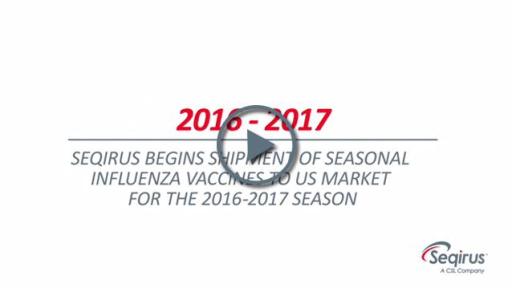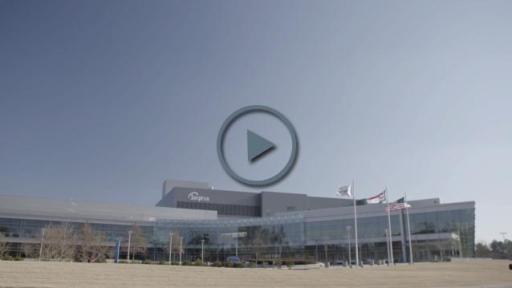On July 31, 2015 the CSL Group and its Affiliates acquired the influenza vaccines business of Novartis AG in the US. The influenza vaccines business, previously owned by Novartis, has been integrated into CSL’s influenza vaccine business and now operates as Seqirus.
Seqirus now shipping its complete portfolio of seasonal influenza vaccines to US market for the 2016-2017 season
- Seqirus is now shipping its complete portfolio of seasonal influenza vaccines to the US market in preparation for the upcoming influenza season
- Seqirus utilizes the latest technologies to offer the broadest portfolio of influenza vaccines in the US, including Fluad™ (Influenza Vaccine, Adjuvanted), Flucelvax Quadrivalent™ (Influenza Vaccine), Afluria® (Influenza Vaccine), and Fluvirin® (Influenza Virus Vaccine)
- According to the Centers for Disease Control and Prevention (CDC), the best way to help prevent the flu is by getting vaccinated each year1
PR Newswire, Holly Springs, NC, August 17, 2016
Seqirus is now shipping its complete portfolio of seasonal influenza vaccines to customers in the US market for the 2016-2017 season. Seqirus is the only influenza vaccine manufacturer to produce influenza vaccines using both egg-based and cell culture technologies, and the only provider in the US that offers both quadrivalent and trivalent influenza vaccines, as well as the only adjuvanted seasonal influenza vaccine.
Seqirus is now shipping to the US all influenza vaccines in its portfolio, including Fluad™ (Influenza Vaccine, Adjuvanted), Flucelvax Quadrivalent™ (Influenza Vaccine), Afluria® (Influenza Vaccine), and Fluvirin® (Influenza Virus Vaccine) in advance of the peak of influenza season.
“Seqirus is proud to be a major contributor to the prevention and control of influenza by offering healthcare providers and pharmacists with a range of clinically proven, innovative vaccination options that help protect people against the debilitating effects of the disease,” said Brent MacGregor, Senior Vice President, Commercial Operations. “We are committed to being an early and reliable supplier of our influenza vaccines to help ensure that appropriate patients have plenty of time to get their annual immunization.”
Fluad, which received approval from the US Food and Drug Administration (FDA) on November 24, 2015, is the first and only adjuvanted seasonal influenza vaccine in the US for adults aged 65 and older.2 Fluad contains the MF59® adjuvant and provides a strong immune response to help protect against the flu.2
Flucelvax Quadrivalent, which received approval from the FDA on May 23, 2016, is the first and only cell culture-based quadrivalent influenza vaccine indicated for children and adults aged four years and older.3 It is manufactured at the state-of-the-art facility in Holly Springs, North Carolina, with cell culture technology, which allows for the potential to rapidly increase production of flu vaccine to help protect the US population in response to outbreaks or pandemic. Development of the technology and manufacturing facility that produces Flucelvax Quadrivalent was supported by a strong public-private partnerships with the US government.4
Afluria is a trivalent influenza vaccine indicated for persons aged five and older and is the only flu shot with a needle-free delivery option.5 Fluvirin is also a trivalent influenza vaccine developed with egg-based technologies and is indicated for persons four years and older.6
“Influenza season can start abruptly with little warning, and its effects can be devastating, especially for high-risk groups like children and adults 65 and older. The best way for people to protect themselves and their families from the flu—and to prevent transmission to others—is by getting a flu vaccine,” said Dr. Gary S. Marshall, Chief of Pediatric Infectious Diseases at the University of Louisville. “It's important for healthcare providers to have a range of influenza vaccine options for different types of patients.”
To reduce morbidity and mortality resulting from influenza, the CDC encourages annual vaccination for all individuals aged six months and older.1 According to the CDC, vaccination to prevent influenza is particularly important for people who are at high risk of serious complications from influenza, including people younger than five years (especially those younger than two years of age); people 65 years and older; pregnant women; people with certain health conditions such as heart disease, diabetes, or chronic lung disease; and people who live with or care for others who are at high risk of developing serious complications.7 Flu immunization can reduce the risk of more serious outcomes such as hospitalizations and deaths, and offers protection in environments where people may be exposed to other sick people or people with the flu.8 Since it takes about two weeks after vaccination for antibodies to develop in the body that protect against influenza virus infection, it is best that people get vaccinated to help protect them before influenza begins spreading in their community.1
About Seasonal Influenza
Influenza is a common, highly contagious infectious disease that can cause severe illness and life-threatening complications in many people. Because transmission to others may occur one day before symptoms develop and up to five to seven days after becoming sick, the disease can be easily transmitted to others.1 Influenza can lead to clinical symptoms varying from mild to moderate respiratory illness to severe complications, hospitalization and in some cases death.1 On average, more than 200,000 people are hospitalized due to influenza-related complications in the US each year.9
About FLUAD
FLUAD is an inactivated influenza vaccine indicated for active immunization against influenza disease caused by influenza virus subtypes A and type B contained in the vaccine.10 FLUAD is approved for use in persons 65 years of age and older.10
Important Safety Information
CONTRAINDICATIONS
Severe allergic reaction to any component of the vaccine, including egg protein, or after a previous dose of any influenza vaccine.10
WARNINGS AND PRECAUTIONS
- If Guillain-Barré Syndrome (GBS) has occurred within six weeks of previous influenza vaccination, the decision to give FLUAD should be based on careful consideration of the potential benefits and risks. 10
- The tip caps of the prefilled syringes contain natural rubber latex which may cause allergic reactions in latex sensitive individuals. 10
ADVERSE REACTIONS
- The most common (≥ 10%) local (injection site) adverse reactions observed in clinical studies were injection site pain (25%) and tenderness (21%).10
- The most common (≥ 10%) systemic adverse reactions observed in clinical studies were myalgia (15%), headache (13%) and fatigue (13%).10
Please see accompanying US Full Prescribing Information for FLUAD.
About FLUCELVAX QUADRIVALENT
FLUCELVAX QUADRIVALENT is an inactivated vaccine indicated for active immunization for the prevention of influenza disease caused by influenza virus subtypes A and type B contained in the vaccine. 11 FLUCELVAX QUADRIVALENT is approved for use in persons four years of age and older. 11
Important Safety Information
CONTRAINDICATION
- Do not administer FLUCELVAX QUADRIVALENT to anyone with a history of severe allergic reaction (e.g. anaphylaxis) to any component of the vaccine. 11
WARNINGS AND PRECAUTIONS
- Guillain-Barré Syndrome (GBS): If GBS has occurred within 6 weeks of receipt of a prior influenza vaccine, the decision to give FLUCELVAX QUADRIVALENT should be based on careful consideration of the potential benefits and risks. 11
- Preventing and Managing Allergic Reactions: Appropriate medical treatment and supervision must be available to manage possible anaphylactic reactions following administration of the vaccine. 11
- Syncope: Syncope (fainting) can occur in association with administration of injectable vaccines, including FLUCELVAX QUADRIVALENT. Syncope can be accompanied by transient neurological signs such as visual disturbance, paresthesia, and tonic-clonic limb movements. Procedures should be in place to avoid falling injury and to restore cerebral perfusion following syncope by maintaining a supine or Trendelenburg position.11
- Altered Immunocompetence: After vaccination with FLUCELVAX QUADRIVALENT, immunocompromised individuals, including those receiving immunosuppressive therapy, may have a reduced immune response. 11
- Limitations of Vaccine Effectiveness: Vaccination with FLUCELVAX QUADRIVALENT may not protect all vaccine recipients against influenza disease. 11
MOST COMMON ADVERSE REACTIONS
- The most common (≥10%) local and systemic reactions in adults 18-64 years of age were injection site pain (45.4%) headache (18.7%), fatigue (17.8%) and myalgia (15.4%), injection site erythema (13.4%), and induration (11.6%).11
- The most common (≥10%) local and systemic reactions in adults ≥65 years of age were injection site pain (21.6%) and injection site erythema (11.9%).11
- The most common (≥10%) local and systemic reactions in children 4 to <6 years of age were tenderness at the injection site (46%), injection site erythema (18%), sleepiness (19%), irritability (16%), injection site induration (13%), and change in eating habits (10%).11
- The most common (≥10%) local and systemic reactions in children 6 through 8 years of age were pain at the injection site (54%), injection site erythema (22%), injection site induration (16%), headache (14%), fatigue (13%), and myalgia (12%).11
- The most common (≥10%) local and systemic reactions in children and adolescents 9 through 17 years of age were pain at the injection site (58%), headache (22%), injection site erythema (19%), fatigue (18%) myalgia (16%), and injection site induration (15%).11
Please see accompanying US Full Prescribing Information for FLUCELVAX QUADRIVALENT.
About AFLURIA
AFLURIA is an inactivated influenza vaccine indicated for active immunization against influenza disease caused by influenza virus subtypes A and type B present in the vaccine.5 AFLURIA is approved for use in persons 5 years of age and older.5
Important Safety Information
CONTRAINDICATIONS
Severe allergic reaction (e.g., anaphylaxis) to any component of the vaccine including egg protein, or to a previous dose of any influenza vaccine.5
WARNINGS AND PRECAUTIONS
- Administration of CSL’s 2010 Southern Hemisphere influenza vaccine has been associated with increased postmarketing reports of fever and febrile seizures in children predominantly below the age of 5 years as compared to previous years.5
- If Guillain-Barré Syndrome (GBS) has occurred within 6 weeks of previous influenza vaccination, the decision to give AFLURIA should be based on careful consideration of the potential benefits and risks.5
- Immunocompromised persons may have a diminished immune response to AFLURIA.5
ADVERSE REACTIONS
- In children 5 through 17 years of age, the most common injection-site adverse reactions when administered by needle and syringe were pain (≥60%), redness (≥20%) and swelling (≥10%). The most common systemic adverse events were headache, myalgia (≥20%), irritability, malaise and fever (≥10%). 5
- In adults 18 through 64 years of age, the most common injection-site adverse reactions when administered by needle and syringe were tenderness (≥60%), pain (≥40%), swelling (≥20%), and redness, itching (≥10%). The most common systemic adverse events were muscle aches (≥30%) and headache, malaise (≥20%).5
- In adults 18 through 64 years of age, the most common injection-site adverse reactions when administered by the PharmaJet Stratis Needle-Free Injection System up to 7 days post-vaccination were tenderness (≥80%), swelling, pain, redness (≥60%), itching (≥20%) and bruising (≥10%). The most common systemic adverse events within this period were myalgia, malaise (≥30%), and headache (≥20%).5
- In adults 65 years of age and older, when administered by needle and syringe the most common injection-site adverse reactions were tenderness (≥30%) and pain (≥10%). No systemic adverse events occurred in ≥10% of subjects in this age group.5
Please see accompanying US Full Prescribing Information for AFLURIA.
About FLUVIRIN
FLUVIRIN is a trivalent, inactivated subunit influenza virus vaccine. It is available to order for the 2016-17 influenza season as both a prefilled syringe and a multidose vial.6
Important Safety Information
CONTRAINDICATION
History of severe allergic reactions (e.g., anaphylaxis) to egg proteins, or any component of FLUVIRIN, or life-threatening reactions to previous influenza vaccinations.6
WARNINGS AND PRECAUTIONS
- If Guillain-Barré syndrome has occurred within 6 weeks of receipt of prior influenza vaccine, the decision to give FLUVIRIN should be based on careful consideration of the potential benefits and risks. 6
- Immunocompromised persons may have a reduced immune response to FLUVIRIN.6
- The tip caps of the FLUVIRIN prefilled syringes may contain natural rubber latex which may cause allergic reactions in latex sensitive individuals.6
ADVERSE REACTIONS
The most frequently reported adverse reactions are mild hypersensitivity reactions (such as rash), local reactions at the injection site, and influenza-like symptoms.6
Please see accompanying US Full Prescribing Information for FLUVIRIN.
About Seqirus
Seqirus is the new global company created in July 2015 from the combined strength and expertise of bioCSL Inc. and the influenza vaccines business formerly owned by Novartis AG. As the second largest influenza vaccine provider in the world, Seqirus is driven by the promise it shares with parent company, CSL Limited, to provide medicines that help to protect and save lives.
Seqirus is a transcontinental partner in pandemic preparedness and a major contributor to the prevention and control of influenza globally, with extensive research and production expertise and manufacturing plants in the US, Europe and Australia and a commercial presence in 20 countries.
Seqirus is part of CSL Limited (ASX:CSL), headquartered in Melbourne, Australia. The CSL Group of companies employs more than 16,000 people with operations in more than 30 countries.
For more information visit www.seqirus.com and www.csl.com.
# # #
References:
- Centers for Disease Control and Prevention (CDC). Key Facts About Seasonal Flu Vaccine. Available at: http://www.cdc.gov/flu/protect/keyfacts.htm. Accessed April 2016.
- US Food and Drug Administration. “FDA Approves First Seasonal Influenza Vaccine Containing an Adjuvant.” Available at: http://www.fda.gov/NewsEvents/Newsroom/PressAnnouncements/ucm474295.htm. Accessed June 2016.
- U.S. Food and Drug Administration. “FDA approves first seasonal influenza vaccine manufactured using cell culture technology.” Available at: http://www.fda.gov/NewsEvents/Newsroom/PressAnnouncements/ucm328982.htm. Accessed April 2016.
- US Department of Health & Human Services. “A milestone in protection from influenza.” US Department of Health and Human Services website. Available at: http://www.hhs.gov/news/press/2014pres/06/20140617a.html. Accessed April 2016.
- AFLURIA (Influenza Vaccine) [prescribing information]. Cambridge, MA: Seqirus; 2016.
- FLUVIRIN (Influenza Vaccine) [prescribing information]. Cambridge, MA: Seqirus; 2016.
- CDC. “People at High Risk of Developing Flu–Related Complications.” Seasonal Influenza (Flu) 2016. Available at http://www.cdc.gov/flu/about/disease/high_risk.htm. Accessed on June 2016.
- CDC. “Flu Vaccine Benefits.” Available at: https://www.cdc.gov/flu/pdf/freeresources/general/flu-vaccine-benefits.pdf. Accessed June 2016.
- Thompson WW, Shay DK, Weintraub E, et al. Influenza-associated hospitalizations in the United States. JAMA. 2004;292(11):1333-1340.
- FLUAD (Influenza Vaccine) [prescribing information]. Cambridge, MA: Seqirus; 2016.
- FLUCELVAX QUADRIVALENT (Influenza Vaccine) [prescribing information]. Cambridge, MA: Seqirus, Inc. 2016.
Media Contact
Monica Galimberti
Corporate Affairs, Seqirus
[email protected]
[email protected]
Phone: +39 335 7440521 (mobile)





